Insomnia is a real and rising problem plaguing populations all over the world. A sleep survey done in 2016 revealed that the average Singaporean sleeps just slightly over 7 hours a day, and compared to other countries surveyed, Singaporeans sleep at a later hour at around 11.45pm. Globally, about 6 in 10 adults have sleep-related issues, with about 26% facing insomnia. Amongst these people, 60% face disrupted sleep due to worrying, primarily overwork, financial or economic issues. Moreover, the percentage of time in the deep sleep stage decreases with age due to various factors like stress, pain, illness and medical problems. [1] If this sounds like you, read on!
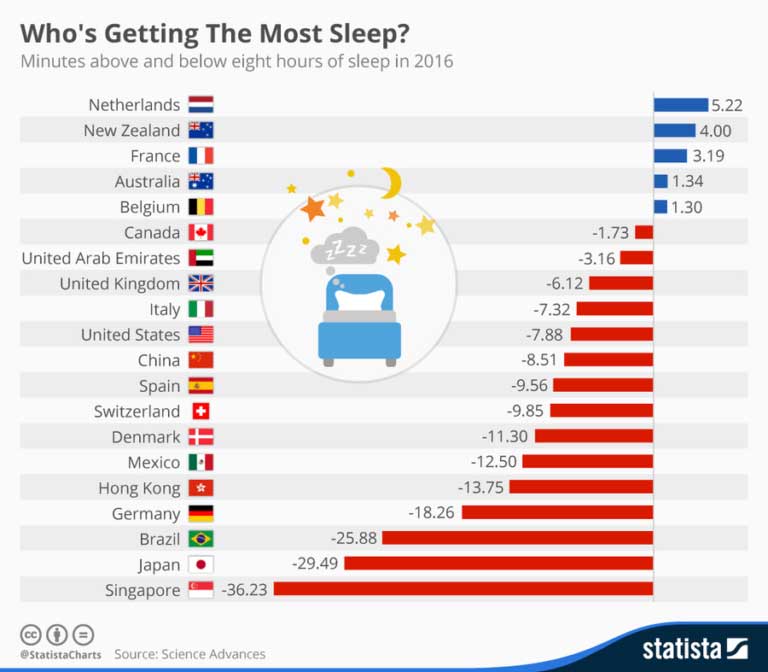 Singaporeans are one of the most sleep-deprived people in the world!!
Singaporeans are one of the most sleep-deprived people in the world!!
Source: statista.com / Science Advances
What exactly is insomnia and why should we treat it?
So what exactly is insomnia? Insomnia is the complaint of inadequate or poor-quality sleep that interferes with normal daytime functioning. Some people may think that insomnia is mere difficulty falling asleep, but so long as you are feeling too tired the next day for your daily activities, you should consider other forms of insomnia you may have – waking up in the middle of the night with problems falling back to sleep or waking up too early in the morning. [2] Such poor quality sleep often leaves people feeling unrefreshed, lethargic, or groggy when they wake up in the morning.
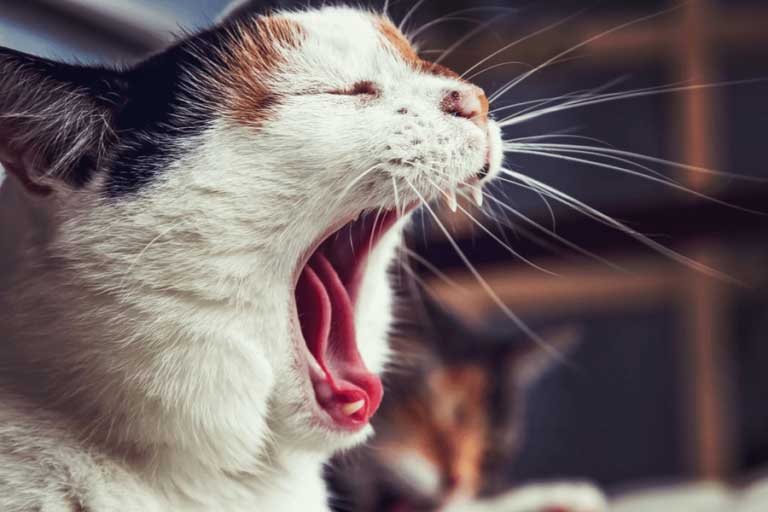
Many people have disregarded their sleep quality or the lack of sufficient hours, failing to realize the health implications that come with sleep deficiency. The short term effects of insomnia include poor concentration, stiff neck, changes in appetite, mood swings, headaches etc. Poor sleep quality over a prolonged period will lead to lower immune system and poor mental health function, and this combination may have dire consequences on our health potentially leading to cancers, diabetes, hypertension and hormonal imbalances. [3]
Short term insomnia, when neglected, can easily become chronic insomnia, which is characterized by more than a month of inadequate sleep. Once chronic insomnia develops, it will be more difficult to manage and restored back to normal.
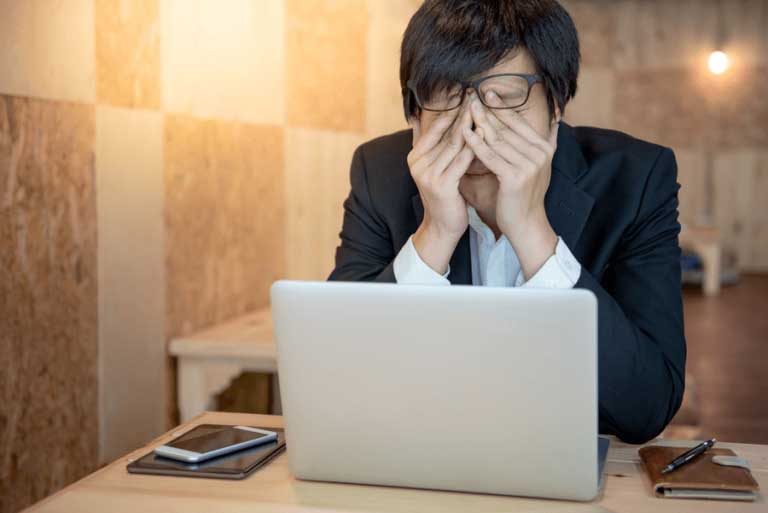
How can we help deal with Insomnia here at Oriental Remedies Group?
Earlier on, we have shared lifestyle habits to avoid – 3 Mistakes You Are Committing That Prevent You From Having A Good Night’s Sleep to help you achieve better sleep. One of the natural remedies includes our concoction of Qi Stagnation Calming Tea to help alleviate sleep disorders such as Insomnia.
Here, we will be sharing how Insomnia can be treated using a conventional TCM approach, as well as with our Technology-Enhanced Therapies uniquely found here at Oriental Remedies.
The approach that TCM uses to treat insomnia is through regular acupuncture and herbal medication.
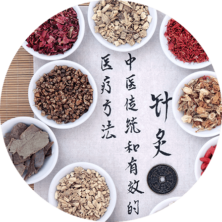
Herbal Medication & Dietary Changes
Liver, heart, spleen and kidney are the key organs that we need to regulate. Symptoms like dizziness, migraines, fatigue, and forgetfulness are all symptoms associated with liver yin deficiency, liver and heart fire, spleen and kidney deficiency.
Other than identifying and treating the root cause of insomnia, the use of herbs like 黄芩Scutellaria baicalensis、茯神Poria cocos、肉桂Chinese cinnamon etc in the prescribed herbal medications can also treat some symptoms associated with insomnia like migraines, bad breath, poor digestion and obesity.
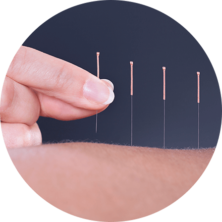
Acupuncture
By stimulating acupoints like 太溪、三阴交 etc. that can boost the liver and kidney energy, regular sessions of acupuncture can help in restoring and re-balancing the yin and yang energies essential for boosting the quality of sleep.
Due to the wide spectrum of symptoms and conditions that can be caused by insomnia, it is always more beneficial to combine both acupuncture and herbal medicine in the treatment of insomnia.
Besides traditional TCM treatments, Oriental Remedies Group also offers Technology-Enhanced Therapies to enhance overall health in patients.
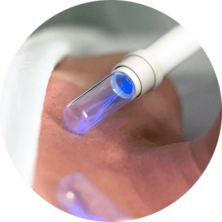
Electro-Lymphatic Therapy (ELT)
Electro-Lymphatic Drainage Therapy (ELT) is a gentle and non-invasive therapy that helps to stimulate proper flow and drainage of the lymphatic system, simulating the effects of a lymphatic drainage massage or tuina without the pain and pressure.
According to research, the loss of sleep, even for a few short hours during the night, can prompt one’s immune system to turn against healthy tissue and organs. Thus, in people with chronic insomnia, there exists tissue-damaging inflammation in the organs that in the long run, may lead to cardiovascular diseases, diabetes, and cancer. With good lymphatic drainage, immune cells can be brought within the lymph fluids to clear damaged cells like inflammatory mediators.
By combining TCM treatments with such Technology-Enhanced Therapies, we aim to achieve overall well-being and help achieve better quality sleep.
Your healing is the most important
In Oriental Remedies Group, we have more than 10 certified bilingual TCM Physicians. Each of them has been trained in both Nanyang Technological University (Singapore) and China for a minimum of 5-8 years, in both Biomedical Science and TCM before being certified to practice in Singapore. Specifically, we have Physician Ng Mei Yun who specializes in treating insomnia and diabetes, to name a few.
Insomnia is so common that many around us often overlook this issue. Action has to be taken fast to correct this disorder through lifestyle changes and early treatments. When the problem becomes chronic, your body is unable to easily get back to its proper sleep cycle and will need stronger actions to be taken to address your sleep disorder. Treatment progress may become longer and more complicated. If you suffer from Insomnia or knows of anyone who do, take action now to get it resolved! Do not sleep on it!
Please contact us at +65 8087 0486 for a personalized consultation.
This article is written by Senior Physician Ng Mei Yun, with contributions from Senior Therapist Hannie Hong.
Disclaimer:
The information on this page is for information and educational purposes only. Such medical information may relate to disease, injury, drugs and other treatments, medical devices and/or health products. Medical information does not amount to advice, and if advice is needed an appropriate professional help should be sought. The disclaimer asserts that no warranties or representations are given in respect of the medical information, and that the website operator should not be held liable if a user suffers any injury or loss after relying upon the medical information.
Electro-Lymphatic Therapy using Lymph-Drainage XP-II is intended for use only for general well-being purposes or to encourage or maintain a healthy lifestyle, and it is not intended to be used for any medical purposes (such as detection, diagnosis, monitoring, management or treatment of any medical condition or disease). Please consult a physician for any medical advice required.
References
- Straits Times. Straits Times. Straits Times. [Online] March 18, 2018. https://www.straitstimes.com/singapore/world-sleep-day-5-interesting-trends-about-zzz
- SingHealth Duke-NUS Sleep Centre. SingHealth. [Online] May 30, 2019. https://www.singhealth.com.sg/patient-care/conditions-treatments/insomnia
- Elsevier. ScienceDaily. [Online] September 4, 2008. https://www.sciencedaily.com/releases/2008/09/080902075211.htm#targetText=Loss%20of%20sleep%2C%20even%20for,inflammation%20according%20to%20new%20research.
- Oriental Remedies Group. Oriental Remedies Group. [Online] 2019. http://www.orientalremediesgroup.com/services/electro-lymphatic-therapy/
- Oriental Remedies Group. Oriental Remedies Group. [Online] 2019. http://www.orientalremediesgroup.com/services/negative-ions-therapy/

